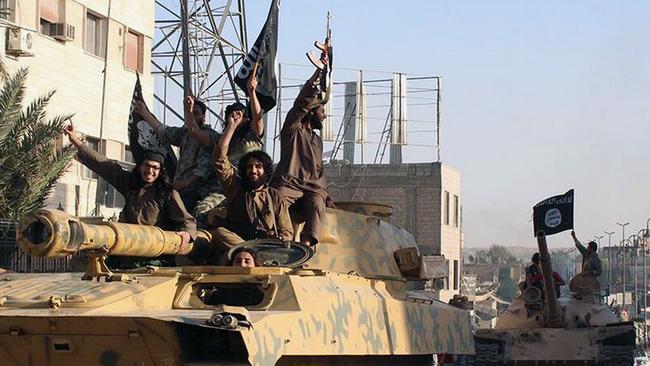The Raqqa Diaries: Escape from Islamic State
“Today I saw an eight-year-old being given a weapon to execute an old man,” starts an entry in this frightening book.

“Today I saw an eight-year-old being given a weapon to execute an old man,” starts one of the entries in this heart-rending book.
Such is a typical day inside the hell that is the Syrian city of Raqqa, the capital of Islamic State. On another day, the writer sees a neighbour beheaded with a sword; when he complains he receives 40 lashes. Women are stoned. Severed heads are left dotted around on park railings and lampposts as warnings.
It used to be that foreign correspondents were the only people who could get stories out of places such as Raqqa. But social media and the internet have changed that. At the same time, some areas have become too hazardous for Western journalists, as they would almost certainly be kidnapped or end up on a video having their head chopped off.
To fill this gap (and explain what it is like for ordinary people living in dangerous countries), a common device has been to use a diary by an insider. Malala Yousafzai came to fame through her BBC journal of life under the Taliban as a schoolgirl who was banned from education; Salam Pax, aka the Baghdad Blogger, also reached a global audience with his account of the last days of Saddam Hussein’s regime.
Unlike foreign correspondents, however, such people don’t fly home after filing their copy. This makes the risks they take far greater. Most dangerous of all places is Raqqa. When Mike Thomson, the BBC world affairs correspondent, tried to find someone inside to write a diary it must have seemed an impossible task.
One of the hallmarks of Islamic State, apart from extreme brutality, is its control over the media. It churns out tweets, videos and magazines extolling life in the caliphate from its own media team, while monitoring internet cafes and banning anyone else from speaking to Western media on pain of death. Among the first people to be beheaded when it took control of Raqqa in 2014 was a media activist.
However, one group that somehow managed to get material out was an organisation calling itself Raqqa is Being Slaughtered Silently. Eventually, its members were forced to flee, but Thomson persisted, and made contact with another small and extremely brave group of activists called al-Sharqiya 24. Thus was born the Raqqa Diaries, which began as a series of short broadcasts on BBC radio, written by a 24-year-old man under the pseudonym Samer.
Starting the morning hearing his matter-of-fact account of life inside what he describes as “a city of broken souls” was compelling listening and a sure-fire way to put into perspective the washing machine breaking down or a delayed train.
The material was smuggled out at huge risk. “We want the outside world to know what is happening,” he explains in The Raqqa Diaries: Escape from Islamic State. “Things they might not otherwise imagine.”
Indeed, in its understated way, this book vividly details almost unimaginable things. An extended version of the radio diaries, its depiction of life for those ordinary Syrians caught between regime bombing and Islamic State cruelty constitutes a damning condemnation of the West’s failure to act, and explains why millions have fled to Europe and elsewhere.
Samer tells of hope in the early days of revolution, when he was a student and joined protests against the corrupt and hated Assad regime. He returns home to Raqqa, and wakes up one day in March 2013 to gunfire as the rebel Free Syrian Army takes over. Optimism, however, quickly turns to despair as Islamic State, which had fought alongside the FSA, drives them out.
Soon religious police are patrolling the streets, telling people how to dress, imposing taxes, banning televisions and forcing Samer and his friends into re-education to become “proper Muslims”. Those who oppose them are hunted and publicly executed. “Every day they make a crowd gather in the square as if they are about to stage a play,” he writes.
Samer never dwells on things, even when his father is killed in a regime airstrike that hits their home on Mother’s Day. But, as he describes collapsing on the floor in the hospital, you can almost hear his howl of anguish. Pain even pursues him when he falls in love and the girl he has met is made to marry an Islamic State fighter to obtain her brother’s freedom.
It is hard to stay dry-eyed at such tragedy, yet for me it is the details that make this so compelling. The small model train, the only toy his father could afford, that is passed on to him and his brothers; the wretchedness of not being able to afford tomatoes for his mother.
Samer knows he is on the wanted list. Eventually, he flees to a camp in northern Syria, leaving his beloved mother so that he can save her the pain of seeing him join the ranks of the slaughtered.
The war is about to move into its sixth year and for me perhaps the saddest lines of this book are these: “The area I am in is full of people like me. Thousands who have fled their homes, running from either Daesh or Assad’s regime. Their suffering, and mine, is not over yet. It’s not even close to being over.”
The book is beautifully produced, with graphic illustrations by Scott Coello. It is only 106 pages, and fits in a handbag or briefcase. Everyone should spare a couple of hours of their life reading it, to remind themselves that, even in the darkest depths of human misery, the bravest of souls still exist.
Christina Lamb is a foreign correspondent and co-author of Nujeen: One Girl’s Incredible Journey from War-torn Syria in a Wheelchair.
THE SUNDAY TIMES
The Raqqa Diaries: Escape from Islamic State
By Samer
Hutchinson, 106pp, $24.99 (HB)


